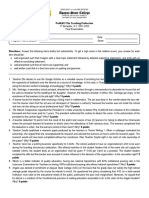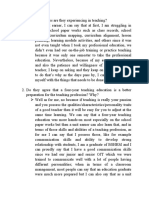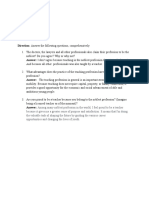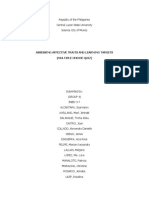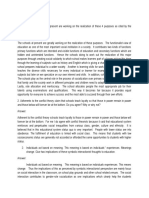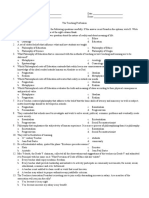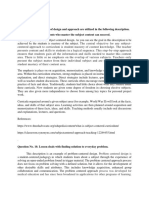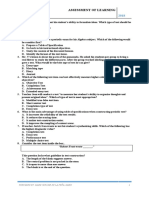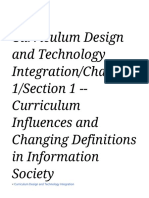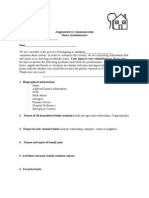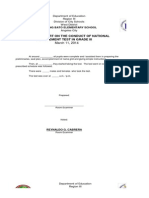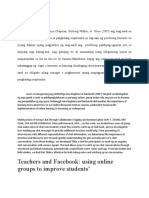Aysa Case Analysis
Aysa Case Analysis
Uploaded by
JHai JhaiCopyright:
Available Formats
Aysa Case Analysis
Aysa Case Analysis
Uploaded by
JHai JhaiCopyright
Available Formats
Share this document
Did you find this document useful?
Is this content inappropriate?
Copyright:
Available Formats
Aysa Case Analysis
Aysa Case Analysis
Uploaded by
JHai JhaiCopyright:
Available Formats
CASE ANALYSIS: Ms.
Maria Jane Castillo was assigned to teach in a remote barrio up in the mountains of Agusan del Sur. She was assigned to teach English for high school students. Her class consisted of 25 male 30 female students coming from different elementary schools in the municipality of Bayugan. Within the first month of her teaching in the barrio, she noted that male students tended to be absent every Monday and Friday. This phenomenon caused the performance of male students in the graded English test to be lower than the female students:
1. Where the difference in the English scores of male and female students
attributable to differences in mental abilities?
Yes, the difference in the English scores of male and female students attributable to variation in mental abilities because male students dont impose further deliberation on their subject matter thats why they have low routine.
2. To which would you attribute this difference?
I would attribute these differences to the strategies that Ms. Castillo used; maybe she used the same strategy throughout her discussion. She disregard the individual diversity between her students while male students did not perform well in there subject matter.
3. If you were Ms. Castillo, what would you do?
If I were Ms. Castillo, I will conduct an individual evaluation headed for my student, so that I can distinguish their strength and weakness. To be competent to discern what kind of approach Im going to use in teaching.
I.
What are the facts?
The fact is, those students have individual diversity that the teacher should recognize or evaluate in order for the students to facilitate toward achieving knowledge and understanding about their lesson.
II.
Who are the people involved?
The person involved in the issue were the students, teacher simultaneously parents.
III.
What are the valued dilemmas?
The valued dilemma is that teacher, are called not merely to instruct student in their subject although this is the crucial chore. We all know that the teachers are the second parents of the students and that teacher should impose good authority.
IV.
What are the alternatives?
The best alternative is to use the four basic evaluation techniques that are suitable for and frequently used in the classroom.
1. Placement evaluation helps to determine student placement or categorization before instruction begins. 2. Diagnostic evaluation is a means of discovering and monitoring learning difficulties. 3. Formative evaluation monitors progress. 4. Summative evaluation measures the products of instruction.
Republic of the Philippines Naval State University Naval, Biliran
College of Education
Case Analysis # 1 In Profed312 Assessment of Learning 1
Aiyessa Diana R. Sedurante III- A Mrs. Gloria Aljo Instructor
CASE ANALYSIS: Ms. Maria Jane Castillo was assigned to teach in a remote barrio up in the mountains of Agusan del Sur. She was assigned to teach English for high school students. Her class consisted of 25 male 30 female students coming from different elementary schools in the municipality of Bayugan. Within the first month of her teaching in the barrio, she noted that male students tended to be absent every Monday and Friday. This phenomenon caused the performance of male students in the graded English test to be lower than the female students: 1. Where the difference in the English scores of male and female students attributable to differences in mental abilities?
YES, it attribute to differences in their mental abilities because of lack of knowledge about the subject matter. Male students tend to get lower grades in subject because theyre not always attending the class than female who are always present and they are participating class discussion.
2. To which would you attribute this difference?
I would attribute these differences to Ms. Ma. Jane Castillo, as a teacher she must guide her students. It is highly desirable, however that she can be aware of social background of the students.
3. If you were Ms. Castillo, what would you do?
For me, to make teaching more effective and learning productive, I will know more the nature of my students to be motivated, directed, guided, and evaluated.
I.
What are the facts?
The fact is that students have individual differences that the teacher should know or evaluate in order that the students are enabling to learn about their lesson in a particular subject.
II.
Who are the people involved?
The people involved are the students, teacher, as well as the parents.
III.
What are the valued dilemmas?
The valued dilemma is that teacher, are called not only to instruct student in their subject although this is the basic task and to do it well is a valuable service but good influence.
IV.
What are the alternatives?
There are different types of alternatives these are
1. Consult the student about the problem 2. Call the attention of the parents and take actions about the problem.
V.
What are the best alternatives?
The best alternative is to use the four basic evaluation techniques that are appropriate for and commonly used in the classroom are the placement evaluation, diagnostic evaluation,
formative and summative evaluation. These students will really study well their lesson.
methods
the
You might also like
- Profed12 Final ExamDocument2 pagesProfed12 Final ExamJomar Diego100% (1)
- Reflection SPEDDocument1 pageReflection SPEDjoyce nacute0% (1)
- Initial Psychiatric FormDocument4 pagesInitial Psychiatric Formfocus16hoursgmailcomNo ratings yet
- Improvement Smart Goals Output Action Steps Time Period Plan ItemDocument4 pagesImprovement Smart Goals Output Action Steps Time Period Plan ItemGjc Obuyes80% (5)
- What Difficulties Are They Experiencing in TeachingDocument2 pagesWhat Difficulties Are They Experiencing in TeachingJason CatalinoNo ratings yet
- Direction: Answer The Following Questions, ComprehensivelyDocument1 pageDirection: Answer The Following Questions, ComprehensivelySheCatriz Layos100% (1)
- ACTIVITY 3-INDIVIDUAL-InocC.Document2 pagesACTIVITY 3-INDIVIDUAL-InocC.Claudia InocNo ratings yet
- TeaProfActivity Topic6and7Document4 pagesTeaProfActivity Topic6and7Abegail arcigaNo ratings yet
- Profed7 Chapter 3 Maam ValeDocument18 pagesProfed7 Chapter 3 Maam ValeJakecrinz CedaNo ratings yet
- Module 5 - The Teacher As A Professional: Study Guide For Module No. 5Document9 pagesModule 5 - The Teacher As A Professional: Study Guide For Module No. 5Darlene Dacanay David100% (1)
- TEACHING PROFESSION MyreviewerDocument2 pagesTEACHING PROFESSION MyreviewerReginald Bien Gaganao Pelayo100% (2)
- Karen Balanag - Make A Reflection1Document2 pagesKaren Balanag - Make A Reflection1Karen Balanag100% (1)
- MODULE-5 Prof Ed 6 (Galorio, Divine Grace V.)Document10 pagesMODULE-5 Prof Ed 6 (Galorio, Divine Grace V.)Divine Grace Galorio100% (1)
- Saint Joseph's College of Baggao, Inc.: Transforming Lives, Shaping The FutureDocument4 pagesSaint Joseph's College of Baggao, Inc.: Transforming Lives, Shaping The FutureMelchor Baniaga100% (1)
- Ed-105-Ombega-Lino Jay-V.-Bsed-Filipino-3b-Module-3-ActivityDocument5 pagesEd-105-Ombega-Lino Jay-V.-Bsed-Filipino-3b-Module-3-ActivityBlythe TVNo ratings yet
- Assignment 5250Document2 pagesAssignment 5250Queenoviah FiercieneNo ratings yet
- PeD MidtermDocument6 pagesPeD MidtermMaela Pollen Elumba YemaNo ratings yet
- Reaction PaperDocument2 pagesReaction PaperJomari Mores100% (1)
- Activity 1.2 - Comparing and Contrasting The Models: (Adapted and Modified From Bilbao Et Al., 2015)Document3 pagesActivity 1.2 - Comparing and Contrasting The Models: (Adapted and Modified From Bilbao Et Al., 2015)macky02 sorenatsacNo ratings yet
- Activities On Educ 10Document47 pagesActivities On Educ 10MARAINE M. SONGCAT100% (2)
- NCBTS Introduction, 1& 2Document4 pagesNCBTS Introduction, 1& 2Lewis A. PearlNo ratings yet
- 14 PrinciplesDocument33 pages14 PrinciplesTep Lee100% (1)
- Module 5 Final Teaching Prof First Sem 2021-2022Document30 pagesModule 5 Final Teaching Prof First Sem 2021-2022RoseNo ratings yet
- Iza Jay Trapa Donato CPE 101-The Teaching Profession Bsed SciencesDocument7 pagesIza Jay Trapa Donato CPE 101-The Teaching Profession Bsed SciencesIza Jay Trapa DonatoNo ratings yet
- Module 1. Basic Concepts in AssessmentDocument24 pagesModule 1. Basic Concepts in AssessmentarjayNo ratings yet
- QUIZ - AffectiveDocument6 pagesQUIZ - AffectiveAnn Clarice0% (1)
- TCC 4 Last PartDocument2 pagesTCC 4 Last Partwayne amparos67% (6)
- Essentialism, Perennialism, Progressivism, and Social Reconstructionism)Document1 pageEssentialism, Perennialism, Progressivism, and Social Reconstructionism)Romeo Jr Vicente Ramirez100% (1)
- Application Chapter 3 ProfedDocument4 pagesApplication Chapter 3 ProfedJayson VelascoNo ratings yet
- TTP Sir PangsDocument5 pagesTTP Sir Pangseunaly anonuevoNo ratings yet
- Tayabas Western Academy: Date SubmittedDocument5 pagesTayabas Western Academy: Date SubmittedPaul Arvin DeChavez Limbo100% (1)
- Psychomotor Domain2Document12 pagesPsychomotor Domain2Lovelyn BaclaoNo ratings yet
- Chapter 6 TPDocument3 pagesChapter 6 TPEmerson Clores86% (7)
- Bpiapacruz@math31, Act5Document8 pagesBpiapacruz@math31, Act5Billy CruzNo ratings yet
- ACTIVITY BENLAC DoneDocument2 pagesACTIVITY BENLAC DoneMikhaNo ratings yet
- Activity 1Document3 pagesActivity 1Joshua BaguioNo ratings yet
- Ped 11.Document2 pagesPed 11.Hassel BarayaNo ratings yet
- Jessa Vill C. - Assignment Pedagogy 2Document3 pagesJessa Vill C. - Assignment Pedagogy 2Jessa Vill Casaños LopezNo ratings yet
- Term PaperDocument4 pagesTerm PaperWebsensei100% (6)
- Prof Ed 7 Lesson 2Document7 pagesProf Ed 7 Lesson 2Jonathia Willian AngcaoNo ratings yet
- Semi Finals AssessmentDocument1 pageSemi Finals AssessmentmarkNo ratings yet
- David, John Lirick, Activity 7Document9 pagesDavid, John Lirick, Activity 7John Lirick David100% (1)
- Lesson 13 Cooperative LearningDocument20 pagesLesson 13 Cooperative LearningMary Grace E. CerioNo ratings yet
- Ca15 Activity 5 (CH2)Document2 pagesCa15 Activity 5 (CH2)Mark Kenneth CeballosNo ratings yet
- Lesson 3Document5 pagesLesson 3SharaS.Ybañez100% (2)
- Formulating Philosophy of EducationDocument11 pagesFormulating Philosophy of EducationJai BalogzNo ratings yet
- Educ 203 CHAPTER 8 Lesson 1Document7 pagesEduc 203 CHAPTER 8 Lesson 1charmen rogandoNo ratings yet
- Making The Most of Community Resources and Field TripsDocument4 pagesMaking The Most of Community Resources and Field TripsLyzette Joy CariagaNo ratings yet
- Nueva Ecija University of Science and Technology: A. Process Oriented Learning CompetenciesDocument40 pagesNueva Ecija University of Science and Technology: A. Process Oriented Learning CompetenciesConnielyn DelacruzNo ratings yet
- CHAPTER 1 - Modu-WPS OfficeDocument17 pagesCHAPTER 1 - Modu-WPS OfficePatricia Geroy100% (1)
- ActivityDocument3 pagesActivityGlenda Hernandez83% (23)
- How History and Society Influenced Curriculum PDFDocument26 pagesHow History and Society Influenced Curriculum PDFJesssel Marian Abraham0% (1)
- Principles of HIGH-QUALITY Classroom Assessment: Roldan C. Bangalan, DME St. Paul University PhilippinesDocument12 pagesPrinciples of HIGH-QUALITY Classroom Assessment: Roldan C. Bangalan, DME St. Paul University PhilippinesRodeza Umeran MaqueraNo ratings yet
- MODULE#3To#9 ACTIVITIES JOENEL - LAZARTEDocument21 pagesMODULE#3To#9 ACTIVITIES JOENEL - LAZARTEJoenel Lazarte0% (1)
- Act 2Document4 pagesAct 2Shine Bausas CalingasanNo ratings yet
- The Teacher and The Community, School Culture and Organizational LeadershipDocument2 pagesThe Teacher and The Community, School Culture and Organizational LeadershipPhftNo ratings yet
- Action Research: BukidnonstateuniversityDocument29 pagesAction Research: BukidnonstateuniversityFrances SeguidoNo ratings yet
- Marvin Sendfs1-3Document21 pagesMarvin Sendfs1-3Angelo BolanteNo ratings yet
- 1 Mdd1colegiollDocument6 pages1 Mdd1colegiollapi-264101017No ratings yet
- Action Research On Absenteeism (1)Document8 pagesAction Research On Absenteeism (1)Elvira96% (110)
- Running Head: Case Study Discussion 1Document8 pagesRunning Head: Case Study Discussion 1api-423339155No ratings yet
- Lab1 0Document14 pagesLab1 0johnlenard.aglahiNo ratings yet
- Reading Is One of The Four English Language Skills That Students Should LearnDocument1 pageReading Is One of The Four English Language Skills That Students Should LearnPutri Nur AzizahNo ratings yet
- Case PresetationDocument21 pagesCase Presetationpeeyush ananfNo ratings yet
- PM MCQDocument8 pagesPM MCQsuraj64778No ratings yet
- How To Work Out Ratios in Psychometric Tests - Graduatewings - CoDocument1 pageHow To Work Out Ratios in Psychometric Tests - Graduatewings - Cocorporateboy36596No ratings yet
- Dear Future SelfDocument6 pagesDear Future SelfJames Melo-Gurny BobbyNo ratings yet
- Criteria of Good Teaching and Learning Based On John Dewey's PhilosophyDocument19 pagesCriteria of Good Teaching and Learning Based On John Dewey's PhilosophyJan DyNo ratings yet
- AAC Home Questionnaire - AdultDocument2 pagesAAC Home Questionnaire - AdultJoyce WestonNo ratings yet
- Dyslexic PowerpointDocument10 pagesDyslexic Powerpointapi-356742255No ratings yet
- Hill Charalambos 2012 Teacher Knowledge Curricular MaterialsDocument19 pagesHill Charalambos 2012 Teacher Knowledge Curricular MaterialsPaolo VinluanNo ratings yet
- Action Research Literature Review ExamplesDocument4 pagesAction Research Literature Review Exampleszqbyvtukg100% (1)
- ESP - English For Specific PurposesDocument200 pagesESP - English For Specific PurposesBuddy100% (1)
- Robertson - Learner-Centered Approaches To Adult Learning - Conference PaperDocument8 pagesRobertson - Learner-Centered Approaches To Adult Learning - Conference PaperatlizanNo ratings yet
- Trans Culture NursingDocument39 pagesTrans Culture NursingVincy Vincent100% (2)
- Field Observation AssignmentDocument16 pagesField Observation Assignmentapi-602796989No ratings yet
- Group 3 ENGLISHDocument11 pagesGroup 3 ENGLISHjesabel miñozaNo ratings yet
- Bped 155 ReviewerDocument10 pagesBped 155 ReviewerJoyce MacerianoNo ratings yet
- NCO201 - TMA01 - Assignment Booklet - Jul2024Document6 pagesNCO201 - TMA01 - Assignment Booklet - Jul2024daphneNo ratings yet
- Nat Alloted TIme and Narrative 2013 - 2014Document13 pagesNat Alloted TIme and Narrative 2013 - 2014Daisy R. Dimabuyu100% (8)
- Teachers and Facebook: Using Online Groups To Improve Students'Document8 pagesTeachers and Facebook: Using Online Groups To Improve Students'JENNILYN BAUTISTANo ratings yet
- Cidam Oral CommDocument5 pagesCidam Oral CommHarlene Marikit AsendidoNo ratings yet
- Department of Education: Republic of The PhilippinesDocument2 pagesDepartment of Education: Republic of The PhilippinesRosemarie R. ReyesNo ratings yet
- Types-of-Errors-in-Hypothesis-TestingDocument9 pagesTypes-of-Errors-in-Hypothesis-TestingLady Jane CaguladaNo ratings yet
- Ee 494 Cumulative ReflectionDocument4 pagesEe 494 Cumulative Reflectionapi-583806946No ratings yet
- 5.2 - System Analysis and DesignDocument19 pages5.2 - System Analysis and DesignPiyush SinghNo ratings yet
- DLP With AnnotationDocument7 pagesDLP With Annotationramises zapicoNo ratings yet
- BK Klasikal 1Document8 pagesBK Klasikal 1azzahraNo ratings yet
- The Art of Critical Thinking Blog 01Document3 pagesThe Art of Critical Thinking Blog 01grithunter0No ratings yet
- SBA #8 - LightingDocument4 pagesSBA #8 - LightinglucyNo ratings yet
